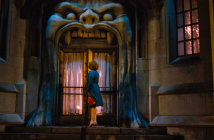
Full Metal Jacket (1987)
Cast: Matthew Modine, R. Lee Ermey, Vincent D’Onofrio
Directors: Stanley Kubrick
Country: USA | UK
Genre: Drama | War
Editor’s Notes: The following review is part of our coverage for TIFF’s Stanley Kubrick: A Cinematic Odyssey. For more information on upcoming TIFF film series visit http://tiff.net and follow TIFF on Twitter at @TIFF_NET.
Based on the novel The Short-Timers by Gustav Hasford, Full Metal Jacket is Stanley Kubrick’s attempt at an exposition on the Vietnam War. This tenuous time in America’s foreign policy history has been turf for other famous directors since the end of the war; Coppola’s Apocalypse Now, Stone’s trilogy (which included Platoon, Born on the Fourth of July, and Heaven & Earth), and more recently Herzog’s Rescue Dawn all take a bite out of various parts of the US’s engagement in southeast Asia. Kubrick takes a rather balanced approach, staging the first half of the film during Private “Joker” Davis’s (Matthew Modine) regimental training, while the latter half sees Joker and parts of his outfit deployed amongst the horrors and distractions of Vietnam.
Based on the novel The Short-Timers by Gustav Hasford, Full Metal Jacket is Stanley Kubrick’s attempt at an exposition on the Vietnam War.
The opening act, set on Parris Island, the Marine Corps Recruit Depot is South Carolina, paints a bleak and contemptuous vision of the military. Throughout these crucial scenes, Joker and his fellow recruits (who are given belittling nicknames such as “Cowboy” and “Pyle”) are repeatedly abused verbally, all the while toting their rifles on marches, runs, and even to bed. Famously, the recruits are expected to treat their rifle like their life, as Senior Drill Instructor Hartman (R. Lee Ermey) constantly requires them to recognize their worthlessness to their country and to the outfit should they not be able to shoot and kill the enemy.

Training the recruits, and specifically the vocal castigations carried out by the drill instructor, provides ample opportunity for both visceral ugliness and tongue-in-cheek comedy, and Full Metal Jacket flourishes in bouncing between these two poles. While eerily documenting corporal punishment doled on one of the recruits one night, the members of the unit begin to act like real human beings, showing traits of vileness and anger which had been washed out, in the setting and in the script, due to the nature of basic training. This allows a scene involving a stolen donut and in turn a collective punishment to have a more amusing appeal. Herman’s portrayal of Hartman operates in a complex position, stealing the first half of the film through an astounding display of rage and restrained shtick while also hampering the development of the characters Full Metal Jacket explores more thoroughly in the second hour. We learn relatively little about Joker and Cowboy besides having a firsthand understanding of how their introduction to the military affects their temperament and attitude while overseas. This background is invaluable yet incomplete, even as basic training provides more than its share of the entertainment throughout the film.
As a champion of ambiguity and utilizing a show-don’t-tell philosophy, the director finishes Full Metal Jacket with a flourish, posing open-ended questions in a foreign land which is vivid in my mind long after finishing the film.
Once in Vietnam, Kubrick jumps headfirst into the hallucinatory setting, which involves around-the-clock threats, prostitutes, and moral ambiguity (although in many instances, the ambiguity is traded for transparent amoral illustrations). Much of the second act gains its momentum through a sheer shock factor, seeing Joker and his new pal Rafterman (Kevyn Major Howard) witness acts of civilian targeting and a mass grave as their introduction to the northern front of the war. Away from the front, Kubrick takes the time to show partial and full financial transactions with Vietnamese prostitutes. These scenes all attempt to comment on the harshness of a war environment, both in the conflict itself and the culture surrounding the battlefield, and in this way, Full Metal Jacket is successful. Up to and including a harrowing conclusion, the film cashes in on the phrase “I am in a world of shit” by spending as much runtime as possible documenting the shit; unfortunately, the reactions or thoughts of the men within this world are stifled, muddied, or ignored altogether.
More interestingly, the film touches on the real-life dilemma of the conflicts with our allies. Joker, Cowboy, and the rest of the crew comment often on how they as American soldiers are treated by the locals they’re commissioned to protect. How the diplomacy of the war in general fails to trickle down to the boots on the ground is compellingly handled, and leads to some of the best dialogue in the film (for example: ”They’d rather be alive than free, I guess. Poor dumb bastards”). Statements like these are made in a relative vacuum, and rather than being pondered or further explored, are generally followed by an action beat and never return. Perhaps for the sake of not making a politically divisive statement, the film doesn’t make many statements at all.
But while Kubrick’s vision of Vietnam at this time in history is distracting, taking nearly all the focus off of a talented cast, perhaps this was on purpose. As a champion of ambiguity and utilizing a show-don’t-tell philosophy, the director finishes Full Metal Jacket with a flourish, posing open-ended questions in a foreign land which is vivid in my mind long after finishing the film. Whatever charm the movie has (and I guarantee you that “charm” is the wrong word), it is not derived from the characters, and instead relies on atmosphere and shock to envelop the audience. At times this is to the film’s credit, and at other times to its detriment, but even if the first half of Full Metal Jacket is far more entertaining and engaging, Kubrick’s second to last film is anything but boring or empty.
At times this is to the film’s credit, and at other times to its detriment, but even if the first half of Full Metal Jacket is far more entertaining and engaging, Kubrick’s second to last film is anything but boring or empty.



